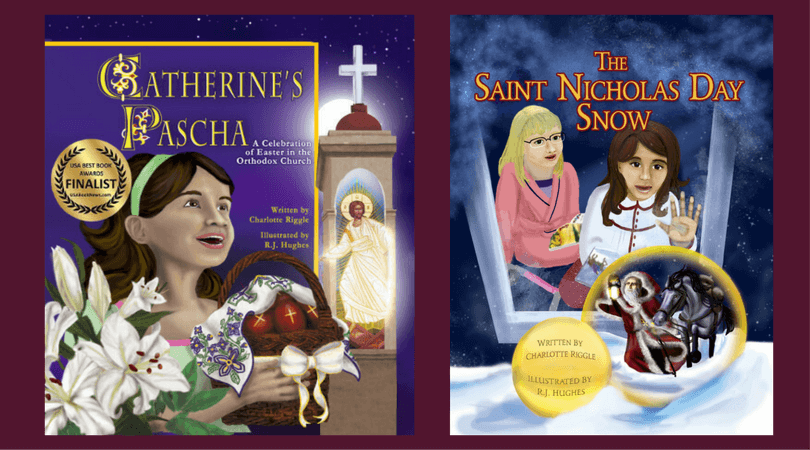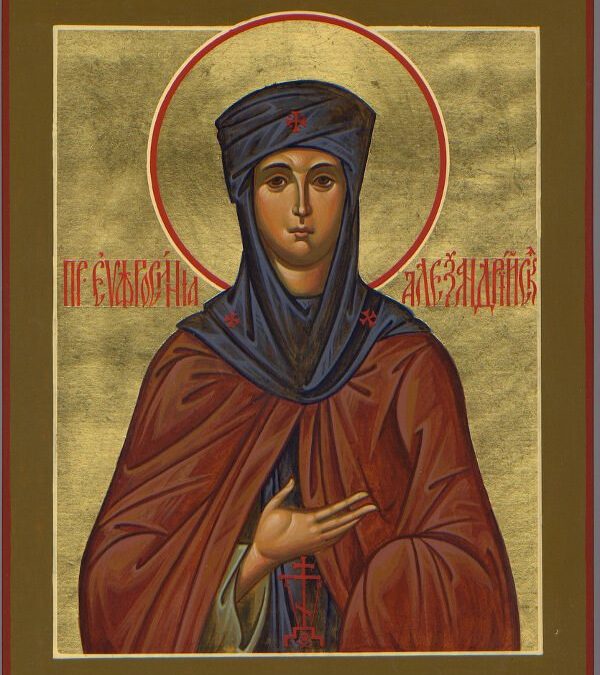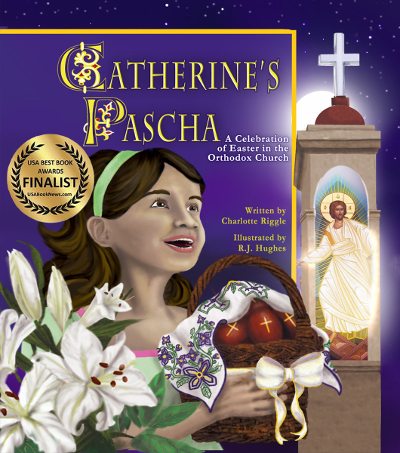When St. Euphrosyne was a child, St. Cyril was the patriarch of Alexandria, the city where she lived. She was the only child of a wealthy and important family. But her mother died when she was still young, and she was raised by her father, a man who was pious in spite of his great wealth.
The Christological controversies filled the air and the conversations of Alexandria during Euphrosyne’s childhood. Patriarch Cyril disputed with the Nestorians. Councils were held in Ephesus. And Euphrosyne’s father spent as much of his time as he could manage at a monastery, talking with the abbot. He brought his daughter with him. She learned much of theology, and much of church politics, from those visits.
When she turned 18, her father chose a husband and planned a wedding for her. They went to the monastery for a blessing, which they received from the abbot. But Euphrosyne didn’t want to marry the young man her father had chosen for her. She would rather lead a life of solitude and prayer.
Somehow, she encountered a wandering monk. The conversation between them must have been fascinating. By the end of it, he agreed to tonsure her, without ever speaking to her father. And without speaking to her father, she left their home to find a monastery. She thought that her father would find her in a women’s monastery. She feared that he would bring her home and force her to marry against her will. But where could she go?
Euphrosyne and Smaragdos
She decided to give up being the woman Euphrosyne. She gave her jewelry and other belongings to the poor. Then, dressing as a man, she became the eunuch Smaragdos, which means Emerald. I can’t help thinking that she took the name as a reminder of all that she had given away.
Smaragdos went to the men’s monastery where Euphrosyne had spent so much time with her father. The monks didn’t realize who he was (or if they did, they didn’t let on), and they took the eunuch in.
Smaragdos spent 38 years there, in a solitary cell. Perhaps, when he decided to go that particular monastery, which he had spent so much time at and loved so dearly, it didn’t occur to him that his father would continue coming to the monastery as he always had. He went there, perhaps, even more often than he had in the past, to seek guidance and comfort after Euphrosyne disappeared.
As Smaragdos’s reputation for wisdom and piety grew, the other monks strove to be like him. And after some time, the abbot began sending Euphrosyne’s father to the eunuch Smaragdos, for consolation and spiritual guidance.
When Smaragdos knew that his death was near, he finally told his father that he was Euphrosyne. Euphrosyne asked her father to be the one to prepare her body for burial. When she died, he did as she asked. Then he gave away all his wealth and came to the monastery as a monk. He lived in the cell that had belonged to the eunuch Smaragdos, laboring for ten years until his own death.
Kontakion of St. Euphrosyne
Desiring to reach the life on high, you earnestly spurned every vain and fleeting pleasure here below and lived among men as if a man, O all-famed Euphrosyne, since for the sake of Christ your Bridegroom you forsook a bridegroom that was temporal.
Read More
17 essential picture books for Orthodox Christian kids: If you’re looking for picture books that include stories about Orthodox Christian people and traditions, you’ll find them on this list.
Disabilities and Special Needs in the Church: Some people are uncomfortable around people with disabilities. They don’t know what to do or say. You can get some advice here, from people with disabilities, to make it easier.
Justinian and Theodora: A Love Story: St. Theodora, the wife and co-ruler with St. Justinian the Great, is one of my very favorite saints.
Buy the Books!

These delightfully diverse books provide disability representation (Elizabeth, one of the main characters, is an ambulatory wheelchair user). They also give Orthodox Christian children the rare opportunity to see themselves in books, and children who are not Orthodox the chance to see cultural practices they may not be familiar with.
Catherine’s Pascha
FINALIST IN THE 2015 USA BEST BOOK AWARDS
Catherine doesn’t like vegetables. She doesn’t like naps. She doesn’t like it when her mom combs her hair. She loves hot dogs, chocolate cake, and her best friend, Elizabeth. Most of all, she loves Pascha! Pascha, the Orthodox Christian Easter, is celebrated in the middle of the night, with processions and candles and bells and singing. And Catherine insists that she’s not a bit sleepy.
Celebrate the joy of Pascha through the magic of a book: Catherine’s Pascha. Available on Amazon, Bookshop.org, and my webstore.
The Saint Nicholas Day Snow
Shoes or stockings? Horse or sleigh? Does St. Nicholas visit on December 6 or on Christmas Eve? Will a little girl’s prayer be answered? When Elizabeth has to stay at Catherine’s house, she’s worried about her grandmother, and worried that St. Nicholas won’t find her. The grownups, though, are worried about snow.
Celebrate the wonder of St. Nicholas Day through the magic of a book: The Saint Nicholas Day Snow. Available on Amazon, Bookshop.org, or my webstore.



